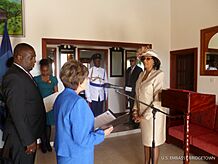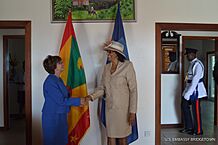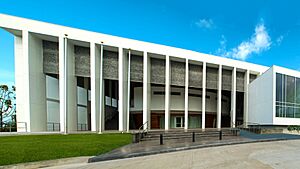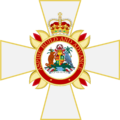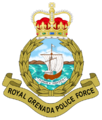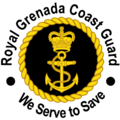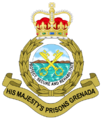Monarchy of Grenada facts for kids
Quick facts for kids King of Grenada |
|
|---|---|
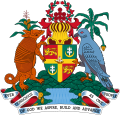
Coat of Arms of Grenada
|
|
| Incumbent | |
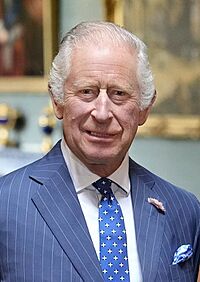 |
|
| Charles III since 8 September 2022 |
|
| Details | |
| Style | His Majesty |
| Heir apparent | William, Prince of Wales |
| First monarch | Elizabeth II |
| Formation | 7 February 1974 |
The monarchy of Grenada is a special way Grenada is governed. It means that a monarch (a king or queen) is the country's head of state. This role is passed down through the family. Since September 8, 2022, King Charles III has been the King of Grenada.
Even though King Charles III is also the monarch for 14 other independent countries in the Commonwealth of Nations, his role in Grenada is unique and separate. He is officially called the King of Grenada. He and other members of the royal family sometimes do public and private duties as representatives of Grenada. However, only the King has a real role in the country's laws.
The King holds all the main power in Grenada's government. For new laws to be made by the Parliament of Grenada, the King's approval (called royal assent) is needed. Most of these powers are used by elected members of parliament and government ministers. The King also has special "reserve powers," like being able to dismiss a prime minister. These powers are very important for keeping the government stable.
The King's role is mainly to make sure the government runs smoothly and continuously. This was especially important during a time of revolutionary government from 1979 to 1983. While the King has some duties, most of his daily tasks are carried out by his representative in Grenada, the Governor-General of Grenada.
Contents
History of Grenada's Monarchy

Grenada was first seen by Christopher Columbus in 1498. At that time, native peoples called the Caribs lived there. Later, French settlers came, and many Caribs were killed. The French started large sugar farms and brought enslaved people from Africa to work on them.
Grenada was a French colony until 1762, when the British took control. It officially became British in 1763. The French took it back in 1779 but it was returned to Britain in 1783. Enslaved people were finally freed in 1833.
From 1885 to 1958, Grenada was the main island for the British Windward Islands government. Then, Grenada joined the West Indies Federation. When that group ended in 1962, Grenada tried to join with other islands in the Eastern Caribbean. In March 1967, the United Kingdom gave Grenada "associate statehood." This meant Grenada could control its own internal affairs.
In 1973, a meeting was held in London to discuss Grenada's future. Grenada became an independent country on February 7, 1974. It became a constitutional monarchy with Queen Elizabeth II as its head of state. Prince Richard of Gloucester was supposed to represent the Queen at the independence celebrations. However, his visit was canceled because the change to independence was difficult. There was violence, strikes, and arguments about Eric Gairy, who became the first prime minister.
People continued to oppose Gairy's rule. In 1979, a group called the New Jewel Movement (NJM) took over the government without violence. They created the People's Revolutionary Government in Grenada, and their leader, Maurice Bishop, became prime minister.
Revolutionary Government (1979–1983)
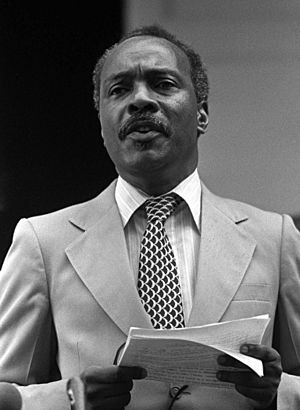
The New Jewel Movement, led by Maurice Bishop, took power on March 13, 1979. They formed the People's Revolutionary Government (PRG). On March 25, Bishop announced "People's Laws." These laws stopped the 1974 constitution from being used, but they kept the Queen as Grenada's head of state. One of these laws said that the Queen would remain the Head of State, and her representative, the Governor-General, would continue to perform duties as advised by the new government.
This was seen as a way for the People's Revolutionary Government to make their rule seem legal. The Governor-General, Paul Scoon, stayed in his job as the Queen's representative. However, he became more of a symbolic figure, as the new government took over most of the power. During this time, from 1979 to 1983, Scoon had a "fairly relaxed" relationship with the new government. This was a unique time, as it was the first time a "communist monarchy" existed within the Commonwealth.
In October 1983, there was a power struggle within Bishop's government. The People's Revolutionary Government was overthrown in a violent event. Prime Minister Bishop and several other government officials were killed. A military group of 16 members, led by Hudson Austin, took power and put Governor-General Scoon under house arrest.
Scoon secretly asked the United States and other Caribbean countries for help to bring peace back to the island. Those who intervened said Scoon had the right to do this, using the special powers of the Crown. On October 25, 1983, the United States invasion of Grenada happened. The military group was removed, and Scoon and his family were safely taken from his home. The US and Caribbean governments quickly confirmed Scoon as the Queen's only legal representative in Grenada. It was later confirmed that Scoon had been in contact with the Queen before the invasion. However, the Queen's office said she did not know about any request for military action and was "extremely upset" by the invasion of one of her countries.
After the invasion, the Governor-General took over the powers of the government and parliament, and the 1974 constitution was put back in place. A group of nine advisors, led by Nicholas Brathwaite, was appointed in November 1983. They served until elections in 1984, which were won by Herbert Blaize of the New National Party. This was one of the few times in Commonwealth history that the Crown was the active and main power in a country.
Grenada's Crown and Its Role
Grenada is one of fifteen independent countries, called Commonwealth realms, that share the same monarch. The monarch's connection to Grenada is completely separate from his role as monarch of any other country, including the United Kingdom. Even though they share the same person as their monarch, each Commonwealth realm, including Grenada, is independent. The King is represented in Grenada by a viceroy, who is the governor-general of Grenada.
Since Grenada became independent in 1974, the Crown has been both shared and separate. The King's role as monarch of Grenada is different from his role as monarch of any other country. This means the monarchy is no longer just a British institution; in Grenada, it has become a Grenadian one.
This separation is shown in several ways: For example, the King has a special Grenadian title. When he acts publicly as a representative of Grenada, he uses Grenadian symbols, like the country's national flag and unique royal symbols. Only Grenadian government ministers can advise the King on matters related to Grenada.
In Grenada, the government is legally known as "His Majesty in right of Grenada" or "the Crown in right of its Government in Grenada."
King's Title
In Grenada, the King's official title is: Charles the Third, by the Grace of God, King of Grenada and of His other Realms and Territories, Head of the Commonwealth.
This title shows that Grenada is an independent monarchy. It highlights the King's specific role as the ruler of Grenada, while also showing the shared connection of the Crown across different countries. Usually, the King is simply called "King of Grenada."
Oath of Loyalty
People in Grenada show their loyalty to the King because he represents the country. This is a promise in return for the King's promise during his Coronation to govern his countries fairly, following their laws and customs.
The oath of loyalty in Grenada is:
"I, (name), do swear [or solemnly affirm] that I will faithfully bear true allegiance to His Majesty King Charles the Third, His Heirs and Successors, according to law. [So help me God.]"
Who Becomes King or Queen?

Like some other countries, Grenada follows the United Kingdom's laws to decide who will be the next monarch.
The rules for who becomes monarch are based on primogeniture, meaning the eldest child inherits, regardless of gender. These rules come from laws like the Succession to the Crown Act 2013, the Act of Settlement 1701, and the Bill of Rights 1689. These laws say that only natural, legitimate descendants of Sophia of Hanover can inherit the throne. They also state that the monarch cannot be a Roman Catholic and must be part of the Church of England.
Even though these laws are controlled by the British parliament, neither the UK nor Grenada can change the rules of who becomes monarch without all the other countries that share the monarch agreeing. This is like a treaty between these countries.
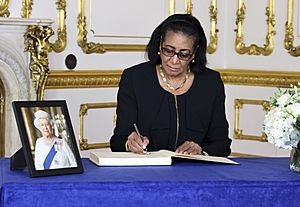
When a monarch dies or steps down, their heir immediately becomes the new monarch. There is no need for a special ceremony right away. It is common for the governor-general to publicly announce the new monarch in the capital, St. George's. A period of mourning follows, and flags across the country are flown at half-mast to honor the late monarch. A memorial service is also usually held.
King's Role in Government
Grenada's constitution sets up a parliamentary system with a constitutional monarchy. This means the King and governor-general have legal and practical roles, but they are not involved in politics. The Crown is seen as a legal body where different parts share power, with the King at the center. All state powers are legally held by the Grenadian monarch. For example, the Crown owns all state property, and public lands are called Crown lands. The government of Grenada is also formally known as His Majesty's Government in Grenada.
The governor-general carries out the duties of the head of state on behalf of the King. However, the King might perform some ceremonial duties when he visits Grenada. The constitution says the King can choose or remove the governor-general. But, by tradition, the King does this based on the advice of the prime minister of Grenada.
All government bodies act under the King's authority. The many powers of the Grenadian Crown are known as the Royal prerogative. Parliament does not need to approve these powers. Also, the Crown's permission is needed before parliament can even discuss a bill that affects the King's powers or interests.
Executive Power
One of the Crown's main duties is to appoint a prime minister. The prime minister then leads the Cabinet of Grenada and advises the King or governor-general on how to use their executive powers for all government and foreign affairs. The King's and governor-general's roles are mostly symbolic. They represent the legal authority under which all governments work. The Cabinet decides how to use the Royal Prerogative. This includes declaring war, keeping peace, and calling or ending parliamentary sessions and elections.
However, these powers belong to the Crown, not to the ministers. The constitution allows the governor-general to use these powers alone in special situations, like dismissing a prime minister, dissolving parliament, or removing a judge during a constitutional crisis.
There are also a few duties only the King performs, such as appointing the governor-general.
To keep the government stable, the governor-general appoints the person most likely to have the support of the House of Representatives as prime minister. The governor-general also appoints a Cabinet, following the prime minister's advice. The King is kept informed by his governor-general about resignations and new appointments. He stays updated through regular messages from his Grenadian ministers. Many officials in government agencies are appointed by the Crown. The appointment of senators, judges, and legal officers also falls under the Royal Prerogative.
Foreign Affairs
The King's special powers also cover foreign affairs. The governor-general approves treaties, alliances, and international agreements. Parliament's approval is not needed for this. However, a treaty cannot change Grenada's local laws; a new law from Parliament is needed for that. The governor-general, on behalf of the King, also approves Grenadian High Commissioners and ambassadors and welcomes diplomats from other countries. Also, Grenadian passports are issued in the governor-general's name, as he is the King's representative.
Parliament's Role
The King, along with the Senate and the House of Representatives, makes up the three parts of the Parliament of Grenada. The King's authority is shown in the ceremonial maces, which have a crown at the top. Grenada has two maces: one for the Senate (made in 1967) and one for the House of Representatives (made in the 18th century).
The King does not take part in making laws himself. The governor-general does, but only by giving royal assent (approval). The constitution also says that the governor-general alone appoints senators. The governor-general must appoint seven senators based on the prime minister's advice. Three more are appointed based on the advice of the leader of the opposition. And three others are appointed after the prime minister talks with groups or interests that the senators will represent. In 2013 and 2018, Grenada did not have a formal opposition party because the New National Party won all seats. In these cases, the governors-general used their own judgment to appoint members of the defeated National Democratic Congress to the Senate to provide opposition to the government.
The governor-general also calls, ends, and dissolves parliament. After parliament is dissolved, the official orders for a general election are usually issued by the governor-general at Government House in St George's. A new parliamentary session begins with the Opening of Parliament, where the King or the governor-general reads the Speech from the Throne.
All laws in Grenada become official only when the governor-general gives royal assent in the King's name. So, bills start with the phrase: "Be it enacted by the King's Most Excellent Majesty, by and with the advice and consent of the Senate and House of Representatives of Grenada, and by the authority of the same, as follows:". The governor-general usually grants or withholds royal assent using the Public Seal of Grenada.
Courts and Justice
The King is responsible for making sure justice is served for everyone. He is traditionally seen as the fount of justice (source of justice). In Grenada, crimes are legally considered offenses against the King. Lawsuits for serious crimes are brought in the King's name, for example, The King versus [Name]. This means the King cannot be charged with crimes in his own courts.
Judges are appointed by the governor-general, based on advice from the Judicial and Legal Services Commission. This is in line with section 88 of the Constitution. The Judicial and Legal Services Commission also appoints Justices of the Supreme Court of Grenada and the West Indies Associated States on the King's behalf. The Chief Justice of the Court is appointed by the King through special official documents. The highest court where people can appeal decisions in Grenada is the Judicial Committee of the King's Privy Council.
The governor-general, on behalf of the Grenadian monarch, can also grant protection from being charged with a crime. They can use the royal prerogative of mercy to pardon offenses against the Crown, either before, during, or after a trial. This power to grant pardons and reduce prison sentences is described in section 72 of the Constitution.
Cultural Role of the Monarchy
Honors and Awards

In the Commonwealth countries, the monarch is seen as the fount of honour (source of honors). Similarly, the King, who is at the top of Grenada's honors system, gives out awards and honors in Grenada in his name. Most of these are given based on the advice of "His Majesty's Grenada Ministers."
In 2007, Grenada passed the National Honours and Awards Act. This law created two national orders: the Prestige Order of the National Hero and the Order of Grenada (which includes the Order of the Nation). The King is the leader of these orders, and the governor-general acts as the Chancellor.
The Crown and the Police Force
Grenada's national police force is called the "Royal Grenada Police Force."
The Crown is at the very top of the Royal Grenada Police Force. The Commissioner of Police is appointed by the governor-general. The St Edward's Crown appears on the police force's badges and rank symbols. This shows that the monarchy is the source of their authority. Grenada's naval force, which is part of the police, is the Royal Grenada Coast Guard. The prison service in Grenada is also known as His Majesty's Prisons.
Every new member of the police force must swear loyalty to the King of Grenada when they are appointed. Under Grenada's Police Act, the current oath is:
"I, (name), do hereby swear by Almighty God (or do hereby solemnly and sincerely declare and affirm) that I will be faithful and bear true allegiance to His Majesty King Charles the Third, His Heirs and Successors, and that I will faithfully serve His Majesty the King, His Heirs and Successors during my service in the Royal Grenada Police Force, that I will subject myself to all Acts, Orders and regulations for the time being in operation that relate to the Force and will discharge all the duties of a police officer according to law, without fear or favour, affection or ill-will."
Grenadian Royal Symbols
The main symbol of the Grenadian monarchy is the King himself. His framed pictures are displayed in public buildings and government offices. The King also appears on special Grenadian stamps. The coat of arms of Grenada, given by royal order in 1973, includes the royal helmet.
Queen Elizabeth II appears on all coins and banknotes of Grenada's money, the Eastern Caribbean Dollar. However, the Eastern Caribbean Central Bank decided in 2023 that the monarch will not be on future money issues.
Crowned ceremonial maces are used in both houses of Parliament to show the King's royal authority. The mace of the House of Representatives has symbols from the royal arms. The mace of the Senate has the royal cypher of Elizabeth II. A crown also appears on awards and police officers' symbols, showing the monarchy as the source of authority.
God Save the King is the royal anthem of Grenada.
Under Grenada's Citizenship Act, new Grenadian citizens must take an oath of loyalty to the King of Grenada and his future heirs.
The King's Christmas message to the Commonwealth is broadcast by the Grenadian government on December 25.
Images for kids
-
Flag of the Grenadian governor-general featuring St Edward's Crown
-
The insignia of the Order of the Nation featuring St Edward's Crown
-
The emblem of the Royal Grenada Police Force featuring St Edward's Crown
-
The emblem of the Royal Grenada Coast Guard featuring St Edward's Crown
-
The emblem of His Majesty's Prison featuring St Edward's Crown
Royal Visits to Grenada
Members of the Royal Family have visited Grenada many times:
- Princess Margaret visited Grenada in 1955.
- Queen Elizabeth II first visited Grenada during her Caribbean tour in 1966. She saw a yachting event, heard a welcome song from children, planted a tree, and viewed an agricultural show. In 1985, the Queen opened Parliament in St George's and attended an awards ceremony and cultural show.
- The Earl of Wessex visited in October 2003 to present awards for The Duke of Edinburgh's Award. He returned in November 2004 to see areas damaged by Hurricane Ivan.
- The Duke of York visited Grenada in February 2004. He toured the Dorothy Hopkins Home for the Handicapped and the Grenada Boys Secondary School.
- The Princess Royal visited in June 2011 to present Gold Awards for The Duke of Edinburgh's Award. She also attended discussions as part of a leadership program.
- The Earl and Countess of Wessex visited in 2012 to celebrate the Queen's Diamond Jubilee. They attended a youth rally, met students at an art exhibition, and unveiled a plaque at the Botanical Gardens.
- The Princess Royal visited Grenada again in 2015 as President of the Caribbean-Canada Emerging Leaders' Dialogue. She attended a discussion at St. George's University and an awards ceremony.
- Prince Harry visited Grenada in 2016, the year of the Queen's 90th birthday. He attended a community sports event, visited Grand Anse Beach to learn about climate change, and saw efforts to rebuild coral reefs and mangroves. He also launched scholarships for hospitality workers.
- Charles, Prince of Wales and Camilla, Duchess of Cornwall visited Grenada during their Caribbean tour in 2019. They were welcomed at the Parliament, saw exhibitions, and toured a chocolate house, meeting farmers and chocolatiers. They also visited an exhibition about the "Blue Economy" (using ocean resources sustainably).
- The Earl and Countess of Wessex were supposed to visit Grenada in 2022 for the Queen's Platinum Jubilee. However, their trip was postponed after discussions with the island's government.
List of Grenadian Monarchs
| Portrait | Monarch's Name (Born–Died) |
Time as Monarch of Grenada | Full Name | Spouse | Royal Family | |
|---|---|---|---|---|---|---|
| Start | End | |||||
 |
Elizabeth II (1926–2022) |
7 February 1974 | 8 September 2022 | Elizabeth Alexandra Mary | Philip Mountbatten | Windsor |
| Governors-General: Sir Leo de Gale, Sir Paul Scoon, Sir Reginald Palmer, Sir Daniel Williams, Sir Carlyle Glean, Dame Cécile La Grenade Prime Ministers: Sir Eric Gairy, Maurice Bishop, Bernard Coard, General Hudson Austin, Sir Nicholas Brathwaite, Herbert Blaize, Ben Jones, George Brizan, Keith Mitchell, Tillman Thomas, Dickon Mitchell |
||||||
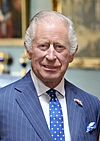 |
Charles III (b. 1948) |
8 September 2022 | present | Charles Philip Arthur George | Camilla Shand | Windsor |
| Governors-General: Dame Cécile La Grenade Prime Ministers: Dickon Mitchell |
||||||
See also
- Lists of office-holders
- List of prime ministers of Elizabeth II
- List of prime ministers of Charles III
- List of Commonwealth visits made by Elizabeth II
- Monarchies in the Americas
- List of monarchies
 | Tommie Smith |
 | Simone Manuel |
 | Shani Davis |
 | Simone Biles |
 | Alice Coachman |


